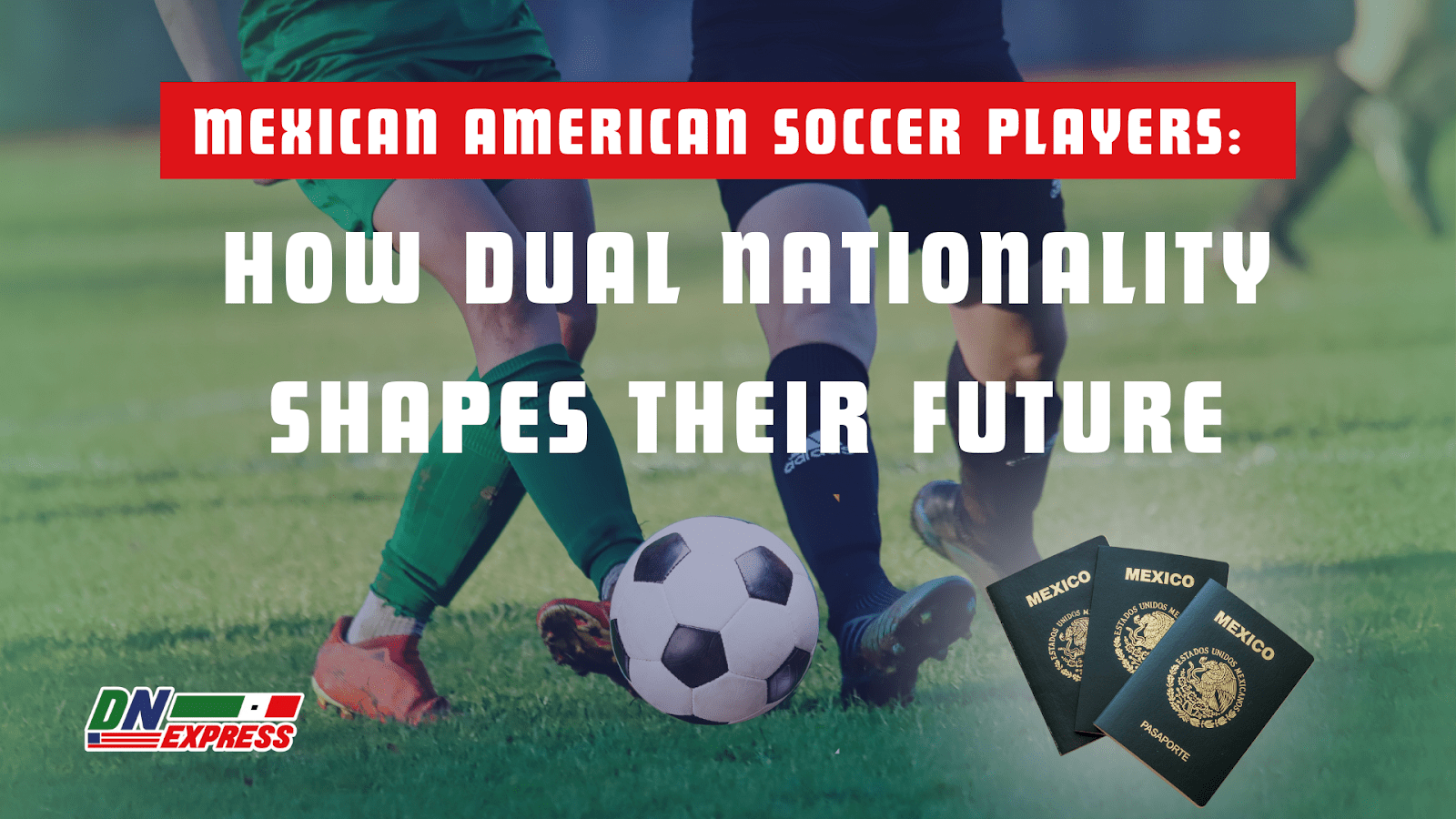
Mexican-American soccer players face a tough choice, represent the U.S. or Mexico?
Their dual nationality opens doors for international play, but also brings cultural and career challenges.
For U.S.-born children of Mexican parents, athletes seeking to represent Mexico, families planning for their kids’ futures, retirees moving south, or business owners needing property rights, Mexican citizenship changes everything.
We help you secure Mexican nationality quickly and securely, no consulate visits, no months of waiting.
If you want to know which players made the switch, how it impacts their careers, and how you can reclaim your Mexican citizenship too, keep reading.
Why Mexican-American Soccer Players Face Unique Decisions
For Mexican-American players, the choice between Mexico and the U.S. goes beyond jerseys, it’s deeply rooted in identity and heritage.
Many grow up feeling “ni de aquí, ni de allá” (“not from here, not from there”), navigating a delicate balance between two cultures.
At home, they speak Spanish, celebrate Mexican traditions, and idolize Chicharito or Hugo Sánchez. Outside, they speak English, play in U.S. youth systems, and dream of World Cups with the Stars and Stripes.
This duality is beautiful, but it can also be exhausting. As Selena’s father famously said in the movie, “We gotta be more Mexican than the Mexicans and more American than the Americans, both at the same time.” For young athletes, that balancing act extends to the pitch, where FIFA rules demand they eventually choose a side.
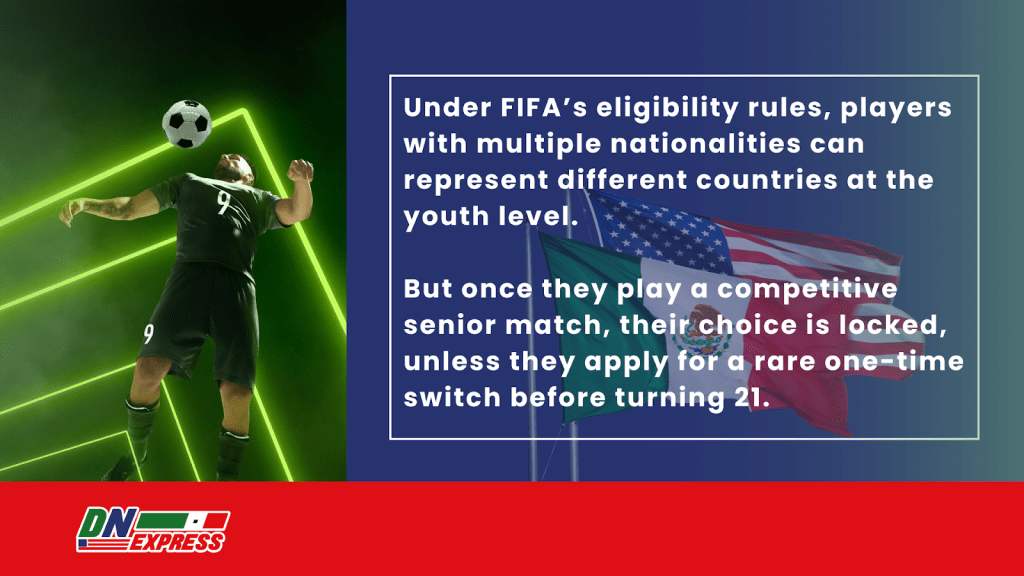
Dual-National Eligibility, FIFA Rules Made Simple
Under FIFA’s eligibility rules, players with multiple nationalities can represent different countries at the youth level. But once they play a competitive senior match, their choice is locked, unless they apply for a rare one-time switch before turning 21.
This technicality has led to tense moments, players leaving U.S. camps early to attend Mexico call-ups, or federations racing to “cap-tie” prospects to prevent a switch.
Stories of Tough Choices: Pepi, Araujo, Ochoa
- Ricardo Pepi was born in El Paso, Texas, to Mexican parents. Despite growing up watching El Tri, he chose the USMNT for quicker opportunities and scored a debut goal in World Cup qualifying.
- Julian Araujo initially played for U.S. youth teams but later switched to Mexico, citing cultural ties and family pride.
- David Ochoa, a promising goalkeeper, also made the controversial decision to represent Mexico after feeling overlooked by U.S. Soccer.
Each of these choices sparked debates on both sides of the border about loyalty, opportunity, and cultural belonging.
Who is the 17-Year-Old Soccer Player in Mexico?
Two names stand out, Cruz Medina and Fidel Barajas. Both Mexican-American prodigies have represented Mexico’s youth squads.
Medina recently joined Mexico’s U20s, while Barajas signed with Chivas, a club that traditionally only fields Mexican nationals.
Their dual-national status keeps them eligible for either country, at least for now.
The Importance of Mexican Citizenship for Soccer Players and Families
Mexican citizenship unlocks opportunities, protects heritage, and simplifies living, working, and owning property in Mexico and the U.S.
For Mexican-Americans, it can shape careers, family decisions, and even where they choose to live in the future.
What Mexican Citizenship Means for Different People
U.S.-Born Children of Mexican Parents
For children born in the U.S. to Mexican parents, doble ciudadanía goes beyond documents, it’s about heritage, opportunity, and a sense of belonging. Citizenship allows them to:
- Reclaim their cultural roots and legally connect to their family’s homeland.
- Get a Mexican passport for easier travel in Latin America and Europe.
- Access Mexico’s universities, scholarships, and national healthcare system, without being treated as a foreigner.
Parents often pursue this early so their children can grow up with the freedom to live and work wherever life takes them.

Athletes & Public Figures
For Mexican-American soccer players, dual citizenship becomes a necessity, not an option. FIFA requires players to hold legal nationality for the country they represent. And clubs like Chivas in Liga MX only field players who can prove Mexican descent.
Citizenship also opens doors for endorsement deals, residency rights, and smooth transitions between U.S. and Mexican leagues.
We’ve helped athletes get citizenship fast enough to meet youth team deadlines and professional contract requirements.
Parents Securing Citizenship for Kids
It’s not just about today, it’s about future-proofing your child’s options. Citizenship gives your kids:
- The right to live, work, and study in Mexico at any point in their lives.
- Freedom from visa restrictions during extended family stays or school exchanges.
- A safety net for job opportunities or property investments down the line.
For many parents, securing their child’s nationality is a way to honor their heritage while setting them up for success.
Adults Planning Retirement or Relocation
Dreaming of retiring in Mexico?
Or splitting your time between both countries?
Mexican citizenship makes it seamless:
- No more visa renewals or residency limitations.
- Full rights to buy property anywhere, even near Mexico’s beaches and borders, which are restricted for non-citizens.
- Access to local healthcare and social services.
Citizenship gives you the peace of mind to plan your next chapter on your terms.
Business and Property Owners
For business owners and investors, Mexican nationality simplifies transactions and eliminates foreign ownership restrictions:
- Buy property outright near coasts and borders (without needing a fideicomiso trust).
- Open businesses without the red tape foreign investors face.
- Enjoy favorable tax benefits as a Mexican national.
This is especially valuable for families who inherited land in Mexico or plan to pass assets to future generations.

Top Mexican-American Soccer Prospects to Watch in 2025
The pipeline of Mexican-American soccer talent is stronger than ever.
These young athletes are redefining what it means to carry two flags, and their career choices have fans on both sides of the border watching closely.
Ricardo Pepi: The Striker Who Chose USMNT Over El Tri
Born in El Paso, Texas to parents from Ciudad Juárez, Pepi grew up on the border, straddling two cultures. After receiving call-ups from both U.S. and Mexican youth teams, he pledged allegiance to the USMNT in 2021.
His choice wasn’t easy, family roots tugged one way, but the opportunity for immediate playing time with the U.S. pulled the other.
Today, Pepi plays in Europe and remains a symbol of how dual nationals must weigh heart and career.
Jonathan Gómez: Dual-National Defender with European Ambitions
Gómez, a left-back raised in Texas, has played for both U.S. and Mexican youth squads. European clubs quickly noticed his technical skills and versatility.
Though still eligible for both senior teams, his eventual choice will hinge on who offers the clearest path to international tournaments.
His story is a reminder of how FIFA's one-time switch rule keeps doors open for players, until that decisive senior cap.
Cruz Medina: 17-Year-Old Midfield Star Balancing Two Paths
Medina is one of the most exciting prospects in North America. The San Jose Earthquakes talent has bounced between U.S. and Mexico youth call-ups, showing his comfort in both systems.
For players like Cruz, dual nationality goes beyond helpful, it's required for participation in Mexico's youth setup.
Will he follow Pepi to the USMNT, or make the switch like Julian Araujo?
Fans are eager to find out.
Alejandro Zendejas & Cade Cowell: Liga MX Moves and Eligibility
Zendejas, a former FC Dallas player, now plays for Club América after choosing Mexico for his senior career.
His case highlighted the importance of paperwork, Mexican citizenship was vital for his Liga MX eligibility.
Cade Cowell, another dual national, joined Chivas in 2024. Since Chivas only signs players with Mexican citizenship or descent, Cade’s dual status was non-negotiable for his transfer.
Can Diego Luna Play for Mexico?
Yes, if Diego Luna holds or obtains Mexican citizenship, FIFA rules allow him to represent El Tri. Born in Sunnyvale, California to Mexican parents, Luna is currently tied to the USMNT youth setup but remains eligible for a one-time switch until he plays a competitive senior match.
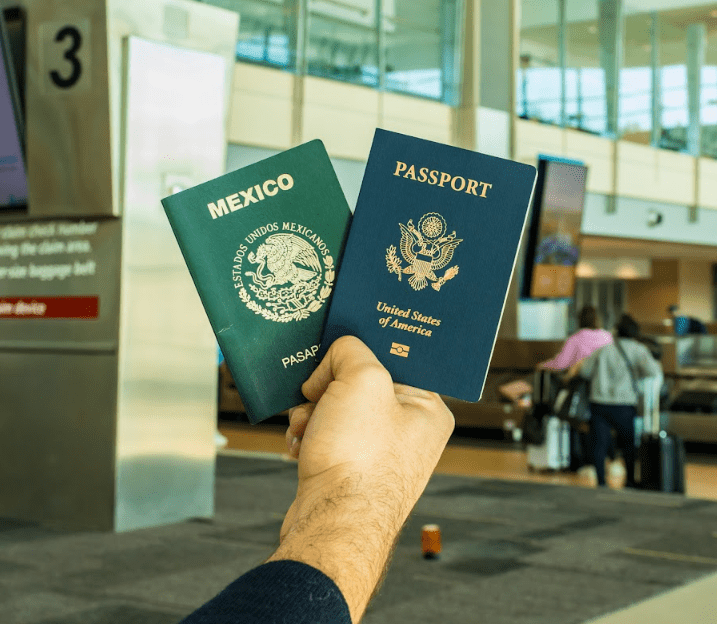
Frequent Questions About Mexican-American Soccer Players
As Mexican-American players rise in both U.S. and Mexican soccer systems, fans on both sides of the border are curious. Here are answers to some of the most frequently asked questions about these talented dual nationals.
What is Mexico’s national soccer team called?
Mexico’s national team is affectionately known as “El Tri”, short for El Tricolor. The name reflects the three colors of the Mexican flag, green, white, and red, that players proudly wear on the pitch.
What’s the name for Mexican people living in the U.S.?
Mexican people living in the U.S. are often called Mexican-Americans. Culturally, some also embrace the term Chicano to celebrate a unique identity that blends Mexican heritage with American upbringing.
Where is Diego Luna from USA soccer?
Diego Luna, a promising USMNT prospect, was born in Sunnyvale, California to Mexican parents. His dual nationality keeps both federations interested, and like other players on this list, he remains eligible to represent Mexico if he secures or confirms citizenship.
Who is the famous soccer player named Diego?
Two notable Diegos stand out:
- Diego Lainez, the Mexican winger who rose to fame with Club América and Real Betis.
- Diego Luna, the young American midfielder mentioned above, who could make headlines for his choice in the coming years.
Which U.S. city has the most Mexicans?
Los Angeles, California is home to the largest Mexican population outside Mexico. This cultural hub has produced countless dual-national players who grew up immersed in both U.S. and Mexican soccer traditions.
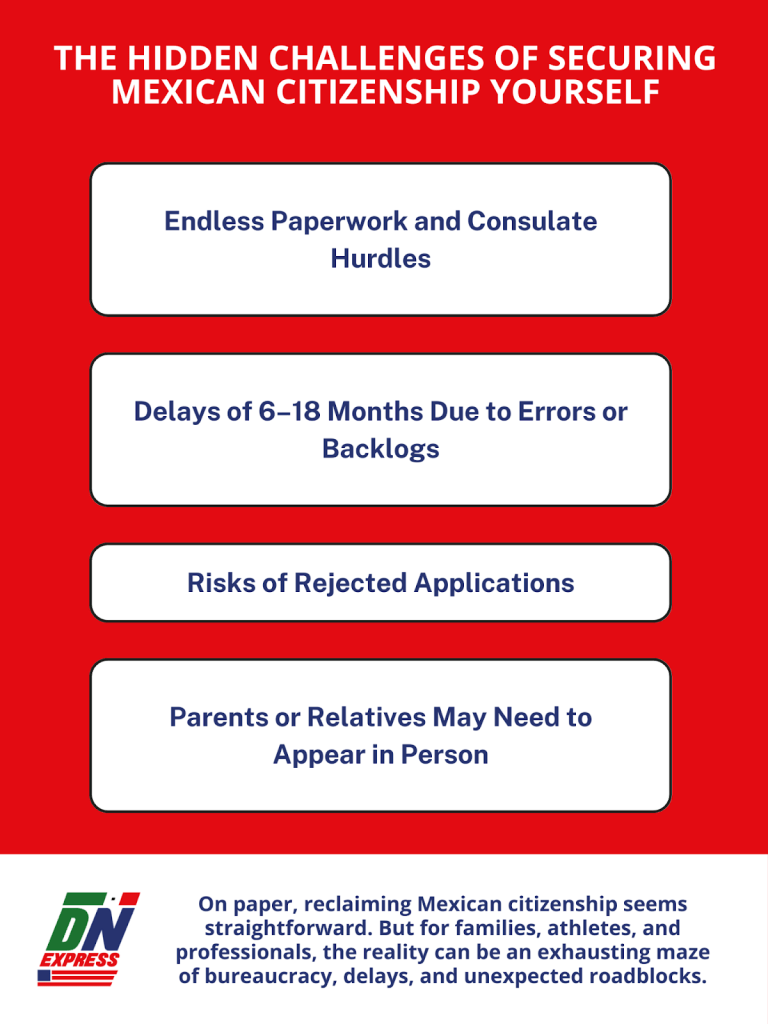
Why Mexican-American Athletes Choose Mexico Over the U.S.
For many Mexican-American soccer players, the choice between representing the U.S. or Mexico isn’t just about soccer, it’s about opportunity, identity, and legacy.
Here’s why some rising stars are increasingly leaning toward El Tri.
More Opportunities for Playing Time
The U.S. men’s national team (USMNT) has seen a surge of young talent competing for limited spots. For dual nationals, Mexico sometimes offers a clearer path to senior team appearances and tournament play. Players like Jonathan González and David Ochoa considered this carefully, with Mexico promising them meaningful minutes and youth team progression.
The Cultural Pull: Family, Language, and Heroes
For many, the decision feels bigger than the game. Family ties often run deep, parents and grandparents who cheered for El Tri, childhood memories of watching Chicharito score for Mexico, and a desire to honor their heritage. Spanish fluency also plays a role, helping players feel more at home in Mexico’s team environment.
Mexico’s Active Recruitment Programs
El Mexican Football Federation (FMF) has invested heavily in recruiting U.S.-born talent. Their “El Camino” program brings free tryouts to U.S. cities with large Mexican-American communities, scouting players overlooked by U.S. Soccer. Liga MX clubs like Chivas also prioritize players with Mexican nationality, creating a natural pipeline.
Will Liga MX Block My European Move?
Some players worry that signing with Liga MX clubs might hurt their chances of transferring to Europe. Historically, Mexican clubs have been criticized for high transfer fees and reluctance to release young stars abroad. This fear leads some dual nationals to stick with U.S. pathways for easier access to European leagues.
Will I Be Criticized as Not “Mexican Enough” or “American Enough”?
The cultural pressure is real. Players who choose Mexico may face criticism from U.S. fans accusing them of betrayal, while others who stay with the USMNT risk being labeled “not Mexican enough.” This dual scrutiny affects players emotionally and professionally, but for many, embracing their roots outweighs the backlash.
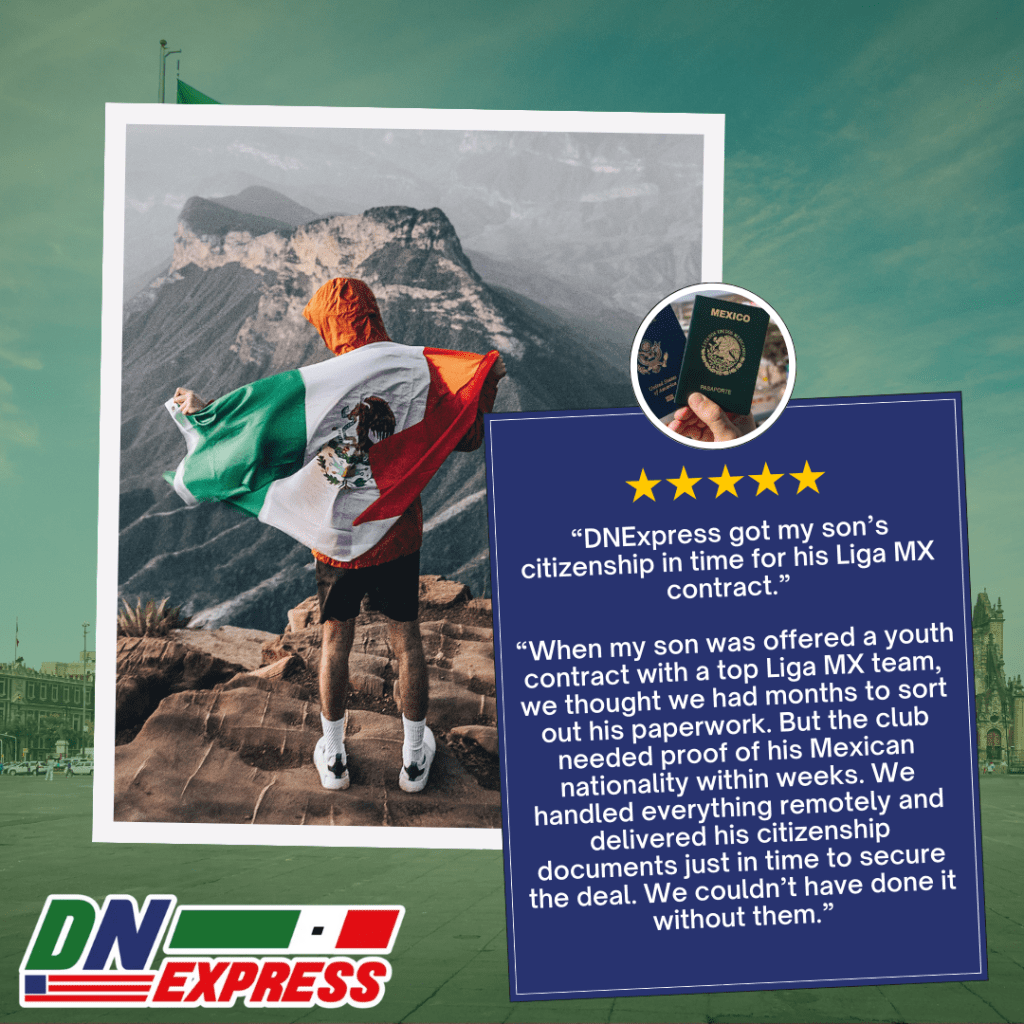
The Hidden Challenges of Securing Mexican Citizenship Yourself
On paper, reclaiming Mexican citizenship seems straightforward. But for families, athletes, and professionals, the reality can be an exhausting maze of bureaucracy, delays, and unexpected roadblocks.
Endless Paperwork and Consulate Hurdles
Mexican consulates across the U.S. are notorious for long appointment wait times and limited slots. Families often wait weeks, sometimes months, just to submit their applications. The paperwork itself is daunting, requiring:
- Certified copies of birth certificates (both U.S. and Mexican)
- Apostilles and official translations
- Proof of parents’ Mexican nationality, sometimes hard to locate after decades abroad
One missing document or improperly notarized form can send you back to square one.
Delays of 6 – 18 Months Due to Errors or Backlogs
Even after submitting your paperwork, processing times vary wildly by consulate. Some applicants wait over a year for approval due to clerical errors, incomplete records, or staffing shortages. For athletes needing citizenship to finalize transfers or join national team camps, these delays can mean missed opportunities.
Risks of Rejected Applications
Every mistake, no matter how small, can lead to rejection.
Missing accents on names, mismatched dates between documents, or failure to include obscure secondary proofs of parentage are frequent pitfalls. For public figures and athletes with tight deadlines, starting over becomes impossible.
Parents or Relatives May Need to Appear in Person
Many consulates require at least one Mexican-born parent to appear in person for the application process.
But what happens if your parents are elderly, live in Mexico, or you’re estranged?
For players raised by one parent or guardians, this requirement alone can stop the process cold.
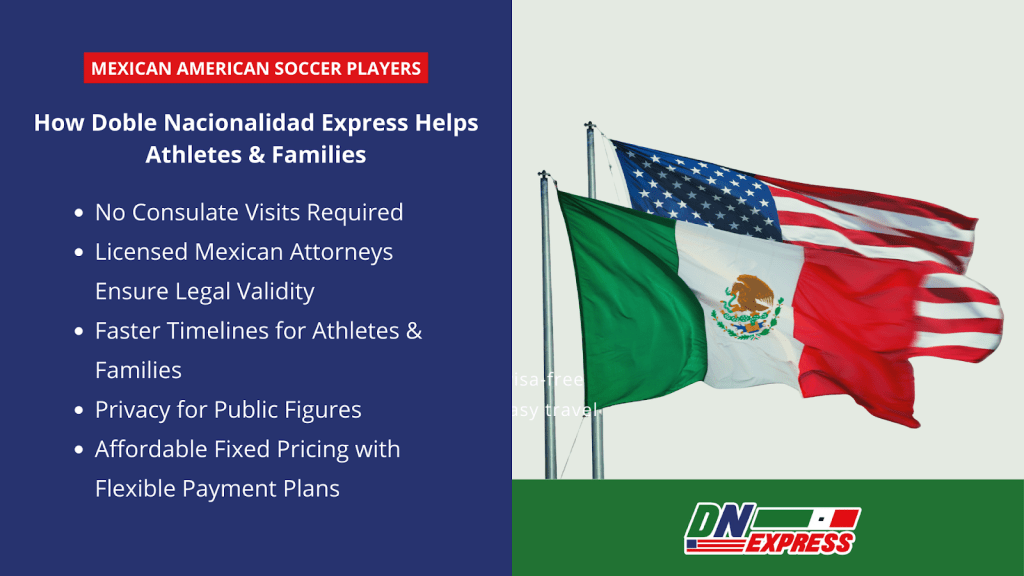
How Doble Nacionalidad Express Helps Athletes & Families
We built our entire service around solving the problems families and athletes face when trying to secure Mexican citizenship.
Whether you’re a professional player on a tight timeline or a parent planning for your child’s future, we make the process faster, safer, and stress-free.
No Consulate Visits Required
Skip the months-long waitlists and in-person appointments. We handle the entire process remotely, so you never have to step foot in a consulate.
Perfect for athletes with demanding schedules or families unable to travel.
Licensed Mexican Attorneys Ensure Legal Validity
Your case is handled by bilingual, licensed Mexican attorneys, not a middleman or a document prep service.
Every step complies with Mexican law to ensure your citizenship is recognized without issues later.
Faster Timelines for Athletes & Families
We understand the urgency of soccer transfers, national team call-ups, and scholarship deadlines.
Our streamlined process can shave months off standard timelines, helping you meet tight deadlines without compromise.
Privacy for Public Figures
For high-profile clients, discretion matters.
Your documents never leave our secure system, and we don’t outsource work overseas. You get the peace of mind that your information is handled with care.
Affordable Fixed Pricing with Flexible Payment Plans
Unlike law firms that bill by the hour, we offer clear, fixed pricing, and flexible payment options for families balancing other expenses.
Secure Your Mexican Passport with DNExpress, Contact Us Today!
Whether you’re reclaiming your heritage or opening doors for a soccer career, we’re ready to help. Reach out now for a free case review and get started from anywhere in the U.S.
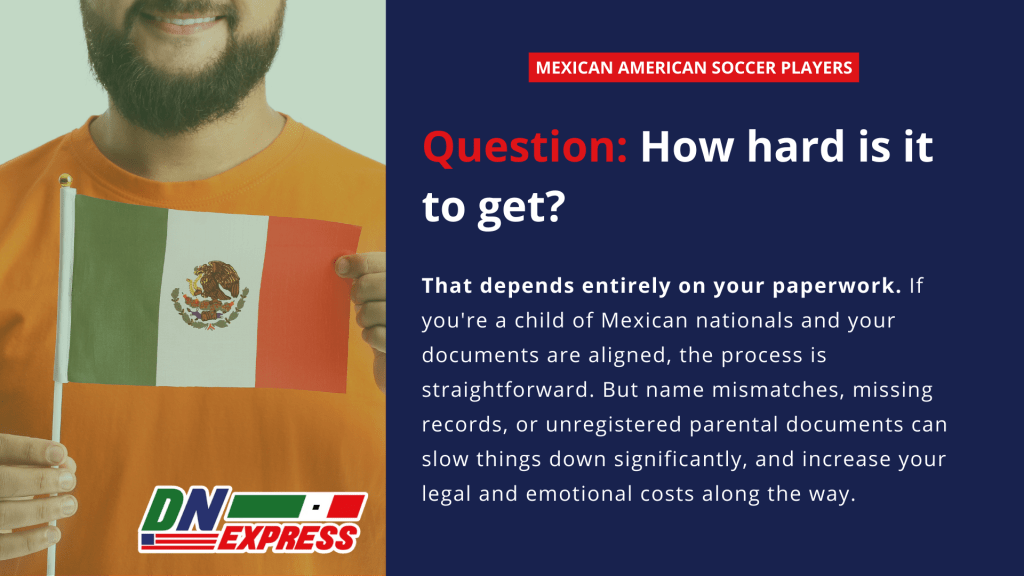
Real Success Stories from Dual-National Clients (Athletes & Families)
We’ve helped hundreds of families and athletes overcome the hurdles of reclaiming their Mexican citizenship. Here are just a few of their stories:
“DNExpress got my son’s citizenship in time for his Liga MX contract.”
“When my son was offered a youth contract with a top Liga MX team, we thought we had months to sort out his paperwork. But the club needed proof of his Mexican nationality within weeks. We handled everything remotely and delivered his citizenship documents just in time to secure the deal. We couldn’t have done it without them.”
“I thought it was too late for me, but they proved I still qualified.”
“As a U.S.-born child of Mexican parents, I assumed I’d missed my chance for dual nationality. DNExpress reviewed my case and showed me I still qualified, even though my parents hadn’t registered me at birth. Now I have my Mexican passport, and I’m planning to retire in Jalisco next year.”
“We avoided months of consulate appointments thanks to DNExpress.”
“Our local consulate had no appointments for six months. With three kids and two jobs, we just didn’t have time to wait. DNExpress made it possible to complete the entire process from home. Their team was professional, fast, and so understanding of our family’s needs.”
This is why athletes, parents, retirees, and business owners across the U.S. trust us, we don’t just process paperwork, we open doors to a future in Mexico.

Ready to Claim Your Mexican Citizenship? Start Here
We help you reclaim your Mexican citizenship to honor your family's legacy, unlock new opportunities, and give your children the freedom to thrive on both sides of the border.
We make the process simple and stress-free:
Free case review via phone or Message Us on WhatsApp
Get answers to your questions from our bilingual legal team.
Step-by-step support from start to finish
No consulate visits, no confusion, no unnecessary delays.
Join thousands of Mexican-Americans reconnecting with their heritage and opening doors for future generations.
Call or Message Us on WhatsApp Now to get started. Your future in Mexico is closer than you think.



